It was time for Jessie Thomas Merica to leave his parents’ home. Because he certainly was not going to get rid of the car he just bought. It was his crowning achievement, as big a purchase as any man could make except a house and besides, it would be a few more years before he even thought about a house of his own.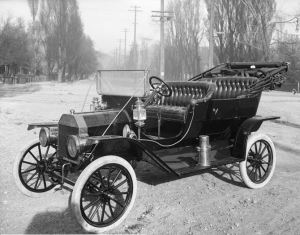
Jessie loved cars more than anything else, had since the day he saw his first one, no doubt. Now his father had told him to get rid of the car or leave, and so for Jessie the decision was easy.
There was nothing his mother, Florence Merica, could do to change either man’s mind. Her husband Tom was as stubborn as any man she’d ever met, except for her son, who was equally stubborn. Now that Jessie was a young man, it was inevitable this day would come. If it wasn’t the car that put the two men at odds it would be something else. You just can’t have two bull-headed men in one house.
Tom Merica was stubborn, but he was not an unreasonable man. What reason did he have for denying Tom a car, then? It’s been said Tom thought Jessie too young, not yet responsible enough. But Jessie was 17, or nearly so, and mature enough to manage work crews on the farm and drive the family car on his own. Maybe Tom was afraid Jessie would go wild now that he had a car. He did have a wild streak, and would later build and race his own stock car. Or maybe the money Jessie used to buy the car was supposed to be for something else. We’ll never know. But one thing is sure: Jessie was leaving home.
His mother and sisters were sad to see him go. The two younger girls, Ruthy and Annie, adored their big brother, though Florence favored Charles, Jesse’s older brother, because of his frailty. Just the same, the girls and their mother cried. But the two Merica men – for at 17 Jessie was indeed a man – stood firm on their respective stances, and the younger Merica packed his meager belongings and left.
It’s just as well, because what happened next was ordained as if by fate. Jessie drove to Waynesboro, 35 miles from Shenandoah, far enough away that he and his father would not be tripping over each other in the small towns of Shenandoah or Elkton, but not so far that he couldn’t see his mother and sisters when he wanted. 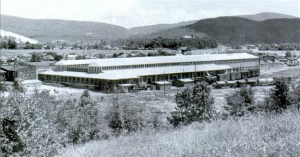 He got a room at Hodge’s boarding house and a job at the Stehli Silk Mill. That’s where he met his future bride, Miss Emily Doom.
He got a room at Hodge’s boarding house and a job at the Stehli Silk Mill. That’s where he met his future bride, Miss Emily Doom.
They courted in his car, of course, and Emily loved that her young man had his freedom — and his own car. He was so handsome, so charming, so sure of himself. He wooed her ardently but respectfully, taking her for long rides in the country, square dancing on Friday nights, Saturday night movies, mooning and flirting on the front porch of the Doom’s home.
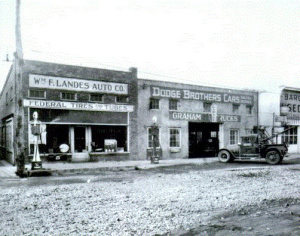 They married two days before Christmas in 1940, and soon after Jessie found a job at Wayne Manufacturing for better pay. He started saving money. He was ambitious, there was a lot he wanted out of life, and he knew that would take money.
They married two days before Christmas in 1940, and soon after Jessie found a job at Wayne Manufacturing for better pay. He started saving money. He was ambitious, there was a lot he wanted out of life, and he knew that would take money.
About that time he became acquainted with Bill Landes, owner of the William F. Landes Auto Company in Waynesboro, which sold and serviced Dodge cars and Graham trucks.
Landes gave him a job as mechanic in his garage. Jessie was in heaven, because nothing could be finer than to have two loves that consume your days and nights. He had his beautiful wife, and a job doing what he loved.
There was nothing he couldn’t do under the hood or chassis of a car. He didn’t need any training. He had a mechanical mind, and had spent a fair share of time working with mechanical tools on the farm, so for Jessie, it was just a matter of logic. He just followed a problem until he found its source. Landes was happy with his work, happy that he had such a responsible employee.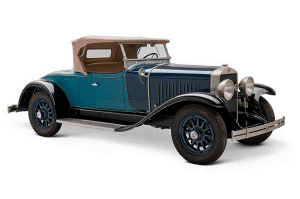
Jessie worked hard and saved even more money, till he had enough to buy a fine, shiny black two-seat Cadillac LaSalle Roadster with a rumble seat in back from Landes’ son, Bill Jr.
He was coming up in the world, and he and Emily cherished their freedom in that car, touring the twisting back roads of Augusta County, just a young couple in love and setting out on a new life together.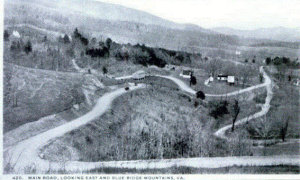
Jessie knew he wanted his life’s work to be with cars. But he also knew he did not want to work for someone else.
He talked with his friend Bill Landes about his hopes for the future, and Bill agreed to back Jesse in getting his own gas station/garage.
The 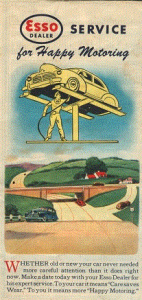 Esso station was on East Main Street in Waynesboro, a busy thoroughfare that got plenty of traffic, which meant plenty of business.
Esso station was on East Main Street in Waynesboro, a busy thoroughfare that got plenty of traffic, which meant plenty of business.
Eventually the young family, for Patsy was born by then, bought a house just a few steps from the station, and Jessie liked that he could frequently come home for lunch or a quick rest.
Business at the station took off. Everyone liked Jesse Merica, looked forward to his friendly greetings and honest service.
Jesse might have spent a lot of time at odds with his father, but he learned the lessons well that his parents taught him. Always look a man in the eye. Be deferential to the ladies. Be honest and fair in all that you do, even when life doesn’t treat you fairly, and you’ll be able to hold your head high.
And Jessie Thomas Merica did do that, hold his head high. By all accounts he was a man larger than life, a handsome man who could command a room with his presence, and whose cockeyed smile and booming laughter could put a person at ease. Everyone in the small town of Waynesboro knew him, respected him, knew they could trust him.
People of all races knew they could count on both his generosity and fairness, and often turned to Jessie when they needed help. They knew that if they needed a quick loan, they could take their shotgun or watch or fishing pole to Jessie’s back door, and Jessie would give them whatever few dollars were necessary until they came to pay him back and retrieve their belongings. Many a Saturday night dinner was interrupted this way.
As his business grew, Jessie could afford to enjoy more time off. 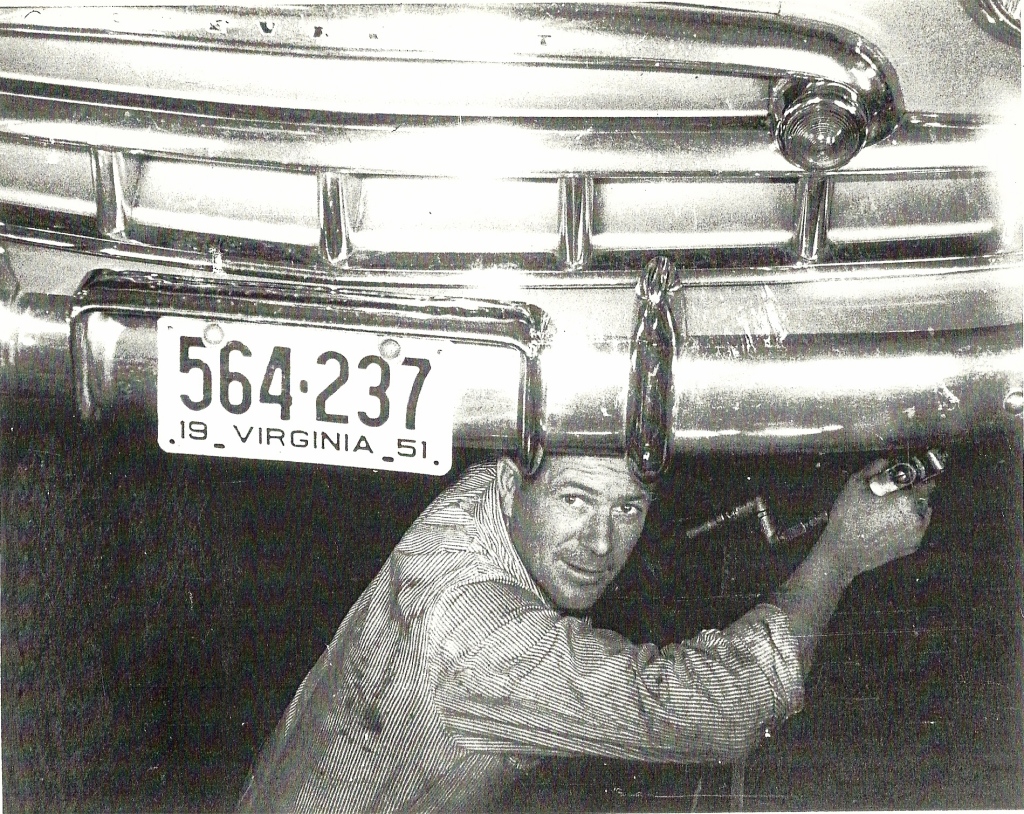 He built a race car, and enjoyed racing the dirt tracks at Keezletown, Natural Bridge, and Winchester. The family made pilgrimages to Daytona for the stock car races; he went nearly every year with Emily and the kids.
He built a race car, and enjoyed racing the dirt tracks at Keezletown, Natural Bridge, and Winchester. The family made pilgrimages to Daytona for the stock car races; he went nearly every year with Emily and the kids.
And nearly every Sunday they went home to visit Jessie’s mother in Shenandoah. Jessie always loved driving those 35 miles down Highway 340, turning right on Naked Creek Rd. at Verbena, then left on Fleeburg Rd, passing the familiar old Oak Creek Church, slowing for the curve at Aunt Minnie’s where he could now see the locust tree standing tall in the distance of his parent’s yard, then passing Uncle Hunter’s just before pulling up in front of his parents home.
Maybe he could have parked in the driveway. But he always parked on the road. It was a narrow road, and there was always the chance that someone might hit his car. But he never forgot that his father wouldn’t let him park his new car in the driveway, way back then when he was 17 and proudly came home with his first car, and so he wasn’t about to let his father forget it. He would park every car he ever had, most of them Cadillacs, on the road, both before and after it was paved. It’s that stubborn Merica gene, shared by both father and son, and not even love or forgiveness are as strong.
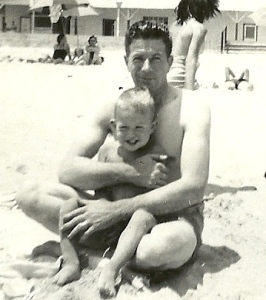 Jessie Thomas Merica died suddenly on October 10, 1972, while doing what he loved most, driving his Cadillac. Waynesboro had seldom seen so many turn out for a funeral. The funeral hall filled and people spilled out over the lawn, coming to pay their respects to the man who for nearly 30 years greeted his customers by name, inquired after their children, quietly helped them make ends meet when they couldn’t themselves, and more than anything, made himself a strong thread in the fabric of the community.
Jessie Thomas Merica died suddenly on October 10, 1972, while doing what he loved most, driving his Cadillac. Waynesboro had seldom seen so many turn out for a funeral. The funeral hall filled and people spilled out over the lawn, coming to pay their respects to the man who for nearly 30 years greeted his customers by name, inquired after their children, quietly helped them make ends meet when they couldn’t themselves, and more than anything, made himself a strong thread in the fabric of the community.

Thank you so much Cindy for writing this beautiful article about my Dad. This is something we will treasure forever and pass down to our children and grandchildren.
I never knew Jessie, but it certainly feels like I do.
That’s a wonderful compliment, Wendy. Thank you.